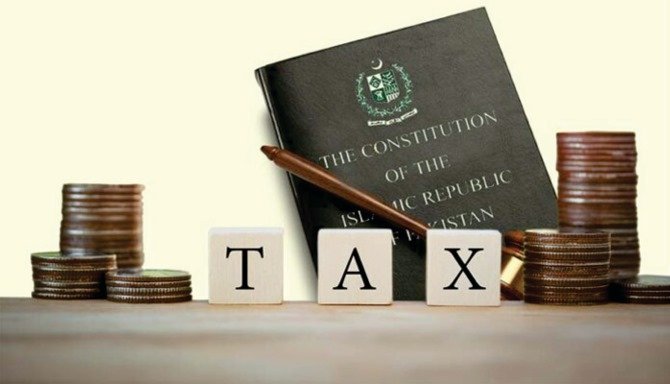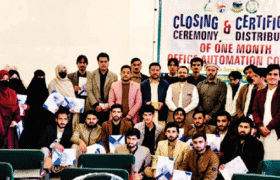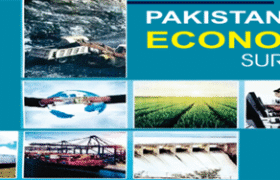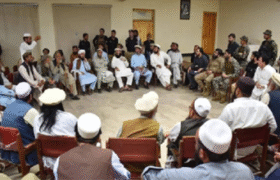DR. BASHIR AHMAD
“Why KP must tax to build—not beg to survive. The road to Khud-Mukhtari is paved with taxes, not talk”
In the rugged valleys and bustling towns of Khyber Pakhtunkhwa (KP), the road to prosperity doesn’t begin with handouts or hope—it starts with revenue reform. The slogans are loud, but the receipts are silent. In a province where history, hardship, and heroism collide, one silent crisis grows beneath the surface: tax apathy. Without fixing our tax system, KP risks remaining a province of potential without performance. The punchline? Pakistan’s economic stability now hinges on plugging this revenue gap to counter rising unemployment, declining purchasing power, fiscal instability, and crumbling living standards.
The National Crisis Behind the Provincial Silence
Pakistan’s debt has surged to Rs. 76 trillion, with Rs. 51.5 trillion in domestic borrowing alone—nearly 70% of total public debt. The external debt load stands at Rs. 24.5 trillion (US$87 billion), but it’s the domestic debt spiral that’s bleeding the economy dry. In the FY2025–26 budget, a staggering Rs. 8.2 trillion is allocated to debt servicing alone—47% of the entire federal budget—more than the combined spend on defense, education, and health. In FY2024–25, Rs. 6.44 trillion in interest payments had already been made by March—66% of the annual target, leaving little room for public investment or provincial development.
This isn’t budgeting. It’s survival mode. And what fuels this crisis? A tax system that bleeds more than it feeds. The gap is papered over with more borrowing—domestic and foreign—tightening IMF strings and shrinking sovereignty.
The Federal-Provincial Disconnect
As the federal government’s fiscal space collapses under debt pressure, provinces remain heavily reliant on NFC transfers. But without enhanced provincial revenue generation, service delivery suffers, autonomy erodes, and future development gets mortgaged to past loans.A comprehensive tax overhaul isn’t just good governance—it’s the only escape route from this debt quicksand.
Now zoom in on KP. Home to over 40 million people (15% of Pakistan’s population), strategically located on the CPEC western corridor, and rich in youth and potential, it should be a revenue engine. Yet it remains a fiscal ghost town. Over 80% of KP’s development budget is funded through federal transfers. We’re running the province with borrowed matches, and when Islamabad sneezes, KP catches pneumonia. Yes, the KP Revenue Authority (KPRA) is trying. In the first ten months of FY2024–25, it collected Rs. 41.9 billion, up 40% year-on-year from Rs. 29.9 billion. Commendable—but still just 2.5% of KP’s Rs. 1.65 trillion budget. The fiscal engine is still sputtering.
To secure genuine autonomy and reduce national debt pressure, KP must aim for own-source revenue equal to 5–6% of its GDP. That’s the threshold for provincial resilience.
Why Tax Matters More in KP

KP is a pressure cooker of challenges: post-conflict reconstruction, climate disasters, urban overload and a ticking youth bomb. From Bajaur to Waziristan, rebuilding after terrorism and displacement needs billions annually, not one-time charity.
Over 50% of KP’s population now lives in urban or peri-urban areas, straining public services like water, waste disposal, transport, and housing. Climate change is slamming KP with glacial floods, droughts, and unpredictable weather, demanding climate-resilient infrastructure. With 65% of the population under 30, the province faces a make-or-break moment: either generate jobs and entrepreneurship or prepare for social unrest.
Without reliable revenue, there’s no way to invest in the future. But the opportunity is real: if just 10% of KP’s informal businesses were taxed fairly, the province could unlock Rs. 40–50 billion annually. That’s enough to build 200 modern schools, launch a universal health program, or digitize every union council from Chitral to D.I. Khan—and still have change to spare.
Building a Tax Culture in KP: From Burden to Pride
If buying naan is taxed, why not a mansion in the hills? It’s time to change the way we think about taxes in Khyber Pakhtunkhwa. If the poor are paying GST on every essential item, the rich cannot keep skating free. Luxury villas, real estate barons, elite housing societies, and commercial plazas in cities like Peshawar and Swat must be brought into the tax net. There can be no sacred cows in a province trying to stand on its own feet.
Tax compliance shouldn’t feel like a punishment—it should be as simple as a tap on your mobile screen. A small shopkeeper in Swabi or a fruit vendor in Dera Ismail Khan should be able to file taxes with the ease of ordering a ride. No agents, no red tape, no excuses. To truly shift the mindset, tax awareness must connect with KP’s cultural heartbeat. Frame it not as a civic duty, but as part of Pakhtunwali—a matter of justice, pride, and responsibility. A slogan like “Tax do, taqdeer badlo!” (Pay tax, change your fate) should echo from billboards to mobile screens across the province. Tax compliance should also come with incentives. Reward those who pay with fast-track public services, digital recognition, and community respect. Make it aspirational – something to be proud of, especially for the rising middle class and the digitally active youth. But above all, there must be transparency. Every rupee collected should be linked to something tangible: a functioning school, a working hospital, a newly paved street. Transparency is the new currency. Without it, even the best systems collapse under mistrust. But collecting taxes is only half the job. People need to see where their money is going. Let local governments—tehsils and union councils—collect and reinvest these revenues directly into their communities. Put up signs that say, “Funded by the People of KP” on every new road, drainage line, or school. When citizens feel ownership, tax stops being a burden—it becomes a badge of dignity.
With the Rashakai Special Economic Zone booming, DI Khan emerging as a trade route hub, and Torkham buzzing with cross-border activity, KP stands on the brink of transformation. But none of that potential will mean much if we fail to capture it through a strong, smart, and fair tax system.
The Bottom Line: From Slogans to Substance
Khyber Pakhtunkhwa doesn’t need pity. It needs power. And that power begins with revenue reform. Taxes are not theft. They’re the price of dignity, autonomy, and development.
KP has fought wars, survived displacement, and shown resilience. Now it must rise again not with borrowed aid, but with its own taxes. Because every rupee not collected in Peshawar today becomes a rupee borrowed from Washington or Beijing tomorrow. And that is a debt this province and this nation can no longer afford.
Dr. Bashir Ahmad is an Assistant Professor at the Department of Economics, Islamia College Peshawar. Email: b.ahmad3@icp.edu.pk





